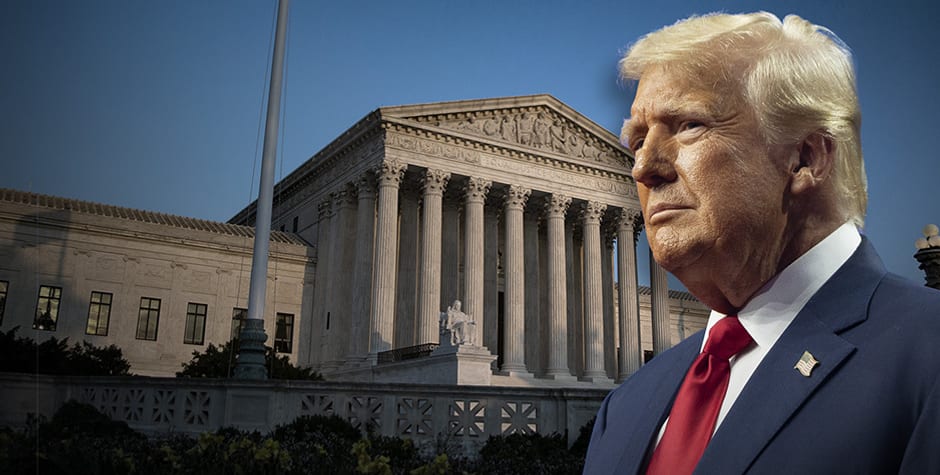ACLJ Files Major Supreme Court Brief on Behalf of West Virginia: Nationwide Injunctions Must Stop
Listen tothis article
The ACLJ just filed a major amicus brief at the U.S. Supreme Court tackling the out-of-control lawfare being waged against President Trump by the Left’s handpicked judges. We filed this brief on behalf of the state of West Virginia, partnering with West Virginia Attorney General J.B. McCuskey. The judicial rulings at issue are not orders issued by the Supreme Court Justices but edicts by a handful of district court judges across the country, indefinitely halting President Trump’s Executive actions through nationwide injunctions.
One of Trump’s Executive Orders, Protecting the Meaning and Value of American Citizenship, has been subject to three of these nationwide injunctions. Nowhere did district court judges gain the power to stall any federal law or Executive action they don’t like, yet for years now that’s exactly what they’ve been doing. To be sure, more narrow injunctions have their place in protecting the rights of litigants before federal courts, but that judicial power cannot and should not be twisted to mean that judges anywhere can stop any law or Executive action at will.
The argument against nationwide injunctions centers on the idea that such sweeping judicial orders exceed the proper scope of a court’s authority. Traditionally, courts are meant to resolve disputes between the specific parties before them, and their rulings should bind only those litigants. The Supreme Court has made it clear that the powers of the federal courts “are limited by historical practice.” Unless there is a historical precedent for the actions of a court, the judge is exceeding his authority. In the Supreme Court case Grupo Mexicano v. Alliance Bond Fund, the Court limited equitable relief to that exercised by the High Court of Chancery of England in 1789, the year Congress created the federal district courts by passing the Judiciary Act (notably, the Supreme Court was created by the Constitution itself). However, nationwide injunctions have no such historical precedent. Rather, as we explain in our brief, most scholars agree that federal courts began the practice in the 1960s, and even then they were exceedingly rare until recent years. Most notably, their use has skyrocketed against the Trump Administration.
Even more troubling, when federal courts go beyond their jurisdiction, wading into political waters, they upset the constitutional order and the separation of powers. The courts are supposed to handle “cases” and “controversies.” The Supreme Court has warned courts not to act as a “council of revision,” meddling with laws passed by the legislature. Yet that’s exactly what courts are doing when they enjoin a law nationwide. Certainly, a judge can block a law’s application to a specific person, but that is very different from a nationwide injunction, stopping the law as to all persons everywhere and effectively overturning the law. Nationwide injunctions allow a single district judge to effectively dictate national policy by preventing the government from enforcing a law or regulation against anyone, not just the plaintiffs. This represents judicial overreach, undermines the principle of the separation of powers, and encourages forum shopping, where plaintiffs seek out sympathetic judges to secure broad relief.
And, as our brief also emphasizes, forum shopping and the broad orders from those sympathetic judges have a significantly destabilizing effect on the legal system. Multiple courts can issue conflicting nationwide orders – some blocking a policy and others upholding it – creating confusion and inconsistency in the law. This disrupts the democratic process by delaying the policies and laws rightly enacted by Congress and the President. It also puts the Supreme Court in a bind; the high Court must either allow lower courts to impose sweeping rules before higher courts have had a chance to weigh in, or wade into the political fray on short notice, compromising efforts to properly consider the issue. We argue that the Constitution and Supreme Court precedent require that injunctive relief should be limited to the plaintiffs and should not extend to nonparties across the country.
More and more, the Supreme Court has had to issue fast-paced emergency stays to rein in this judicial overreach. These cases (Trump v. Casa, Trump v. Washington, and Trump v. New Jersey) are no exception, where the Supreme Court must weigh these decisions on the “emergency docket,” sometimes called the “shadow docket,” as the decisions are often made with time-constrained briefing and hasty – or no – oral argument. The Supreme Court has recently begun to address some of these issues to stem the overreach in equitable relief, including ruling on the appealability of temporary restraining orders.
However, federal district judges continue to issue nationwide injunctions unabated. Now, with a growing number of broad and controversial legal questions before the Supreme Court, it is clear that these complex questions of history, government, and the law should be dealt with carefully and thoroughly. Instead, because of judges going well beyond their jurisdictional powers, the Supreme Court must weigh in early before a complete record can be developed. This is not what the Founders intended in establishing Article III judicial powers.
We partnered with the West Virginia Office of the Attorney General, working with my good friend, Attorney General McCuskey, to submit our brief. Together, we argue that the Supreme Court should take this opportunity to tell district court judges to respect the limits of their jurisdiction and the Constitution’s judicial power. Only parties to the legislation should be affected by a court proceeding, and judges should not sit and act as “councils of revision” but instead as referees calling balls and strikes for the parties before the court.
The Supreme Court has expedited review in this case with oral argument set for May 15. We will continue to keep you updated as this critical case proceeds. How the Supreme Court handles the issue of these nationwide injunctions will impact a host of other cases in which we are involved.
